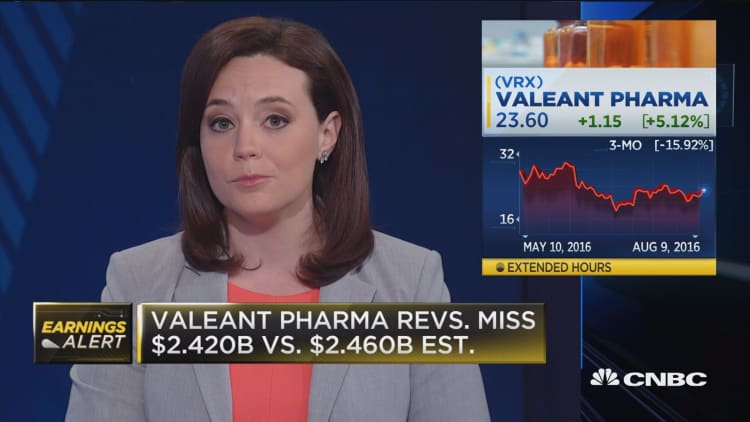
Valeant Pharmaceuticals reported quarterly earnings and revenue that fell short of analysts' expectations on Tuesday, but stood by its full-year forecast as it tries to restore investor confidence after facing a storm of criticism over its business practices.
Shares of Valeant gained more than 25 percent on Tuesday.
CEO Joseph Papa told CNBC that Tuesday's price action reflects increased confidence in the company as it stabilizes and returns to growth. He added that he doesn't agree with speculations that Valeant may have to accept lower prices when it sells off non-core assets.
"These assets we're considering to be sold are not going to be in a fire sale. They have real value to potential purchaser," Papa said. He added that he is "very confident" that Valeant will get "fair market value" for these assets.
Board member and activist investor Bill Ackman has previously said that Valeant has no plans to sell core assets like Bausch & Lomb.
The Canadian drugmaker in the past year has faced intense political and investor scrutiny for its steep drug price increases and unorthodox use of a specialty pharmacy.
Valeant, which has about $30.77 billion in debt, also had to appease creditors after missing deadlines for filing financial reports, triggering default notices.
The company posted second-quarter earnings of $1.40 per share on $2.42 billion in revenue.
Analysts had expected the company to post earnings of $1.48 per share on $2.46 billion in revenue, according to a Thomson Reuters consensus estimate.
Valeant said it still sees full-year 2016 adjusted earnings of $6.60 to $7.00 a share, versus a $6.53 a share estimate, on revenue of $9.9 billion to $10.1 billion.
In July, CNBC reported that the embattled company's former CEO, J. Michael Pearson, unloaded more of his personal holdings than originally thought. Pearson sold nearly 5 million shares and options for a total of $96.8 million. The news came on the same day that the Sequoia Fund revealed it is completely out of the stock. Sequoia was at one time the largest Valeant shareholder.
The Canadian drugmaker came under fire when The New York Times reported that Valeant and other pharmaceutical companies were using a network of specialty pharmacies to sustain sales of their high-priced drugs and prevent patients and insurers from switching to cheaper generic drugs. Citron Research subsequently published a note calling Valeant the "pharmaceutical Enron."
In response, Valeant formed an ad hoc committee to review the allegations regarding specialty pharmacy Philidor RX Services. The U.S. Securities and Exchange Commission is investigating the relationship between the two companies.
— CNBC's Meg Tirrell, Christine Wang and Everett Rosenfeld, and Reuters contributed to this report.

